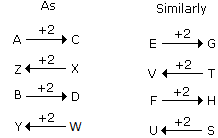Discussion
Home ‣ Verbal Reasoning ‣ Statement and Assumption See What Others Are Saying!
- Question
- Statement
"If Mr 'X' does not mend his ways. I will call the police.
Assumptions
I. Mr. 'X' may mend his ways.
II. The police may help me.
III. Mr 'X' was my friend in past.
Options- A. I and II are implicit
- B. II and III are implicit
- C. I and III are implicit
- D. All are implicit
- Correct Answer
- I and II are implicit
Explanation'It he does not mend his ways' implies that there is a possibility for him to mend his ways. Hence, Assumption I is implicit. Further, the person is depending upon the police, if he finds it necessary. It means the person must be assuming that police will help him. Hence, Assumption II is also implicit. Assumption III is nothing to do with the given statement.
- 1. If you propose to the government, it will relent.
(i) Amit proposed to the government.
(ii) Amit relented.
(iii) Government relented.
(iv) Government did not relent.
Options- A. (i) (iii)
- B. (iii) (i)
- C. (iv) (ii)
- D. (ii) (iv) Discuss
- 2. QPO, SRQ, UTS, WVU, (?)
Options- A. XVZ
- B. YXW
- C. ZYA
- D. VWX Discuss
- 3. Only romantic boys give roses to girls.
(i) Ashok is romance.
(ii) Ashok gave roses to a girl.
(iii) Ashok did not give roses to a girl.
(iv) Ashok is a romantic boy.
Options- A. (ii) (iv)
- B. (i) (ii)
- C. (i) (iii)
- D. (ii) (i) Discuss
- 4. Only students or teacher visit the library.
(i) Rajesh is in the library.
(ii) Shiva is in the library.
(iii) Rajesh is a student.
(iv) Shiva may be a teacher.
Options- A. (i) (iii)
- B. (iii) (i)
- C. (ii) (iv)
- D. None Discuss
- 5. Statement
The best way to escape from a problem is to solve it.
Conclusions.
I. Your life will be dull, if you don't face a problem.
II. To escape from problems, you should always have some solutions with you.
Options- A. If Conclusion I follows
- B. If Conclusion II follows
- C. If neither Conclusion I nor II follows
- D. If both Conclusions I and II follow Discuss
- 6. AZBY : CXDW :: EVFU :?
Options- A. GTHS
- B. GHTS
- C. GSTH
- D. TGSH Discuss
- 7. ACEG : IKMO :: QSUW :?
Options- A. YZCE
- B. YACD
- C. YACE
- D. YBCE Discuss
- 8. Those visiting the Taj Mahal are either tourists or historians.
(i) Siya is historian or a tourist.
(ii) Riya is a tourist.
(iii) Siya is visiting the Taj Mahal
(iv) Riya is visiting the Taj Mahal
Options- A. (iv) (ii)
- B. (i) (iii)
- C. (iii) (i)
- D. Both (i) and (iii) Discuss
- 9. Statement:
Mr X is planning to transform the old sweet shop into a fast-food joint.
Conclusions :
I. Fast food is mush more in demand than sweets.
II. Diabetes is on the rise.
Options- A. if only conclusion I follows
- B. if only conclusion II follows
- C. if only conclusion II follows
- D. if neither I nor II follows, and Discuss
- 10. Statement
The local civic body has urged all the residents to voluntarily reduce consumption of potable water by about 30% to tide over the water crisis.
Assumptions
I. Many residents may reduce consumption of potable water.
II. Many activists may welcome the civic body's move and spread awareness among residents.
Options- A. if only Assumption I is implicit
- B. if only Assumption II is implicit
- C. if either Assumption I or II is implicit
- D. if neither Assumption I nor II is implicit Discuss
More questions
Correct Answer: (i) (iii)
Explanation:
The statement is of the type: if A then B.
Correct Answer: YXW
Explanation:
From given figure , it is clear that
On adding 2 in Each letter of given series .We get , The next term of above given series is YXW.
Hence the correct option will be B .
Correct Answer: (ii) (iv)
Explanation:
The statement has the logical connective 'only' and this does not imply that all romantic boys will give roses to girls but if a boy has given a rose to a girl, he must be romantic.
Correct Answer: (ii) (iv)
Explanation:
The statement has the logical connective 'only' and this does not imply that all students or teacher will visit the library.
Correct Answer: If Conclusion II follows
Explanation:
The conclusion that follows the statement is Conclusion II because the only way escape the problem is to face it.
Correct Answer: GTHS
Explanation:

Correct Answer: YACE
Explanation:

Correct Answer: (iii) (i)
Explanation:
The statement is a simple 'either A or B'.
Correct Answer: if only conclusion I follows
Explanation:
I follows because people generally make such transformations keeping in mind the taste of the people. II does not follow because sweet may have lose their glory not because of sugar (in fact, chocolates are in vogue in spite of sugar content) but because of changing taste.
Correct Answer: if only Assumption I is implicit
Explanation:
Assumption is implicit as a request is made to the people with assumption that they would comply. Assumption II is beyond the scope of statement because it take into account the activists.Hence, II is invalid.
Comments
There are no comments.More in Verbal Reasoning:
Programming
Copyright ©CuriousTab. All rights reserved.
